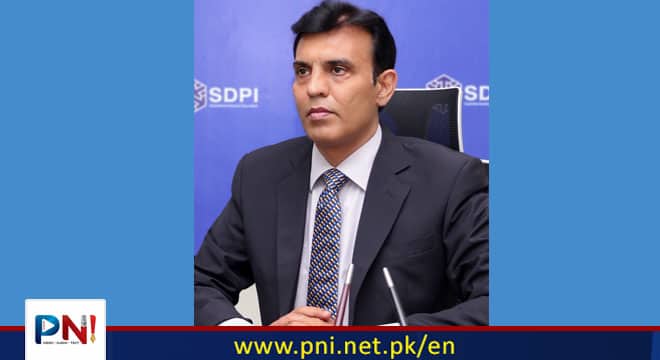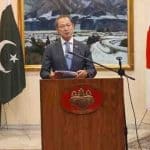ISLAMABAD, Dec 04 (APP): Executive Director, Sustainable Development Policy Institute (SDPI), Dr Abid Qaiyum Suleri on Monday while attending various sideline events at COP-28 global conference underscored that the developing counties, G-77 plus China need to establish unity for working out indigenous solutions as just energy transition without proper finances was elusive.
The SDPI Executive Director is participating in the 28th Conference of the Parties (COP-28) to the United Nations Framework Convention on Climate Change (UNFCCC) as special delegate in various plenaries, group discussions and other important deliberations taking place at the critical environmental moot of the world.
In his exclusive chat with APP, the SDPI Executive Director said that the G-77 plus China countries should revive the same spirit as it was demonstrated at the previous COP-27 in Sharm el-Sheikh, Egypt.
Dr. Suleri noted that it should be floated as a proposal for the next or the other successive COP meeting to achieve tangible results. “This requires some sort of financing that I call DAI (Data, Action and Investment). So, when we have investment then we require data to understand investment prospects and action again not only by the development partners but also by the recipient country and the people working on it,” he added.
The SDPI head hoped that the COP-28 would come up with some kind of oil and gas initiatives and climate funds of its own helping in transition as just energy transition to clean energy is important.
“This is something we should add from developing countries to our composite and transitory phase finance and it is being called transit finance by civil society groups.”
He added that the climate finance, Loss and Damage Fund and Transit Finance can work for the developing world that SDPI is advocating for these countries.
“We have more than one economic giant and majority of them today are not part of the global financial institutions as per proportion to their GDP and economic might. There is a push from the countries like China to IMF, WB, ADB and economic chains for a bigger role,” he added.
Dr Suleri further elaborated that the global decarbonization initiative was being signed by the countries at COP-28 that was basically about carbon removal through capture and sequestration measures that was brought under discussion under this initiative.
“If business as usual continues amid carbon removal then it can be further promoted whereas nuclear technology is being discussed as a potential source of it,” he added. Secondly, the negotiation is on Adaptation Fund where developing countries (G77 plus China) are demanding increase in it.
Third focus of agenda is GST which is indicating that the world is lagging behind its required target that indicate to review the fossil fuel consumption and the discussion is stuck on phase out and phase down of petroleum.
Dr Suleri added that the next agenda much debated point is on climate financing that is having a new dimension where the developing countries are questioning the efficacy of global financial institutions in addressing the climate change demands like the IMF, World Bank and others.
“The SDPI stance is that global financial system should be revamped and this point should be addressed but we don’t want the funding to stop due to this. We are happy if interim arrangements like those for loss and damage fund is operationalized under World Bank but we want to have an independent climate financial institution in the long run,” he added.
On Adaptation Fund, he said the SDPI believed that it could be further scaled up this is something that could save billions of dollars on mitigation if adaptation is strengthened.
Dr Suleri said the Institute was talking about just energy transition as it is obvious that the developing nations want to phase out fossil fuel but 80% of world energy is coming from fossil fuels and for countries like us it would not be able to do it overnight and no country could do it. “Clean Energy should have just energy transition and SDPI demands a transition financing as well,” he added.
Deputy Executive Director SDPI Dr Shafqat Munir while speaking at just transition, urban, and resilience themes at COP side events today said the world cannot achieve the goal of NetZero unless rapid, equitable and just transition-based NDCs are revisited by the countries.
He said that most of the countries have given over commitment without attaching finance for their climate actions so the revisions in Nationally Determined Commitments (NDCs). Pakistan also needs to review its NDCs commitments which can be aligned with the National Adaptation Plan, mitigation action, and SDGs commitments.
Dr Shafqat said though it is challenging to 100% transition to renewable energy, but still we have to move towards fossil fuels phase out with some other tangible climate actions such as 100% more climate finance, triple solar and wind energy in the total energy mix, double energy efficiency. Only with these and more actions we can reach a global agreement to NetZero, he added.
On human rights in the context of climate change, Dr Shafqat opined that without observing human rights, we cannot ensure peace and climate resilience. He called for protecting civilian rights and giving space to civil society to make a smooth and just transition to a more people’s centric and resilient societies including one in Pakistan. He called for providing more loss and damage funds as current commitments are just peanuts.
Follow the PNI Facebook page for the latest news and updates.









